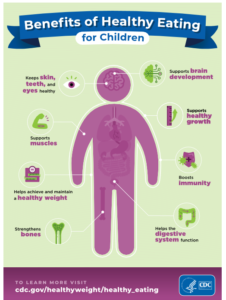A healthy eating plate is essential for the mental and physical development of kids. Here are some key reasons why healthy food is essential for overall well-being:

- Nutrient Supply
Healthy foods are rich in essential nutrients such as vitamins, minerals, proteins, carbohydrates, and fats. These nutrients play a vital role in various bodily functions and in maintaining good health.
- Disease Prevention
A balanced diet consisting of fresh fruits, vegetables, whole grains, lean proteins, and healthy fats is associated with a lower risk of chronic diseases such as heart disease, diabetes, certain cancers, and obesity.
- Assist in Weight Management
Healthy foods are generally lower in calories and higher in nutritional value, making it easier to manage body weight and prevent excessive weight gain.
- Increases Energy and Vitality
Nutrient-dense foods provide the energy required for daily activities and help combat fatigue, promoting an overall sense of vitality and well-being.
- Healthy Digestive System
Foods that are rich in fibre, such as fruits, vegetables, and whole grains, support digestive health by promoting regular bowel movements and maintaining a healthy gut microbiome.
- Improves Brain Function
Nutrient-rich foods, especially those containing omega-3 fatty acids, antioxidants, and other brain-boosting nutrients, support cognitive function and may reduce the risk of age-related cognitive decline.
- Supports a Strong Immune System
A well-balanced diet with adequate vitamins and minerals strengthens the immune system, making the body more resilient to infections and illnesses.
- Skin and Hair Health
Healthy foods provide essential nutrients that contribute to healthy skin, hair, and nails, promoting a youthful appearance and preventing common skin issues.
- Mental Health
While diet alone cannot treat mental health disorders, a healthy diet is associated with improved mood and overall mental well-being. Certain nutrients, such as omega-3 fatty acids and B vitamins, are linked to better mental health outcomes.
A body with the necessary nutrients reduces the risk of chronic diseases, maintains a healthy weight, and supports overall physical and mental well-being. A balanced and varied diet that includes a wide range of nutrient-rich foods is key to achieving these benefits.
How to Let Kids Adopt Healthy Eating Habits?
Encouraging kids to adopt healthy eating habits is essential for their overall well-being and development. Here are some tips to help promote healthy eating habits in children:
- Be a role model:Kids often imitate the behaviour of their parents and guardians. Demonstrate healthy eating habits yourself by choosing nutritious foods and eating a balanced diet. Make mealtime a positive and enjoyable experience.
- Involve kids in meal planning and preparation:Letting kids participate in meal planning and cooking can increase their interest in food and nutrition. Take them grocery shopping and let them choose fruits, vegetables, and other healthy options.
- Provide a variety of nutritious foods:Offer a wide range of nutritious foods, including fruits, vegetables, whole grains, lean proteins, and dairy products. Try to incorporate different colours, flavours, and textures to make meals more exciting.
- Limit processed and sugary foods:Reduce the intake of processed foods high in added sugars, salt, and unhealthy fats. Instead, opt for whole, unprocessed foods that provide essential nutrients.
- Set regular meal and snack times:Establish consistent meal and snack times to create a routine for eating. Avoid skipping meals, as it can lead to unhealthy snacking and overeating later.
- Make healthy snacks available:Keep healthy snacks easily accessible to kids. Examples include cut-up fruits, yogurt, nuts, whole-grain crackers, and carrot sticks.
- Encourage mindful eating:Teach kids to pay attention to their hunger and fullness cues. Encourage them to eat slowly and savour the flavours of their food.
- Limit sugary beverages:Water should be the primary beverage for kids. Limit sugary drinks like soda, fruit juices, and flavoured milk, as they can contribute to excessive calorie intake.
- Avoid using food as a reward:Refrain from using unhealthy foods as rewards or punishments. Instead, find non-food rewards or praise for positive behaviours.
- Be patient and persistent:Adopting healthy eating habits takes time. Be patient and continue offering nutritious foods even if your child initially refuses them.
- Educate about nutrition:As kids grow older, teach them about the importance of balanced nutrition and how it supports their growth, energy, and overall health.
- Minimize distractions during meals:Encourage family meals and minimize distractions like television or electronic devices during eating. This can help children focus on their food and practice mindful eating.
- Don’t force food choices:Forcing kids to eat specific foods can create negative associations with those items. Instead, offer a variety of healthy options and let them decide how much to eat.
Type of Food Items You Should Restrict for Kids
When it comes to children’s diet, it’s essential to promote a balanced and healthy approach. While occasional treats are acceptable, some specific food items should generally be restricted or limited for kids to ensure their overall well-being. Here are some examples:
- Sugary snacks and desserts
- Sugary beverages
- Processed and fast foods
- High-calorie and low-nutrient foods
- High-caffeine foods and drinks
- Meals with Unhealthy fats
- Excessive Amount of salt
- Raw or under-cooked foods
